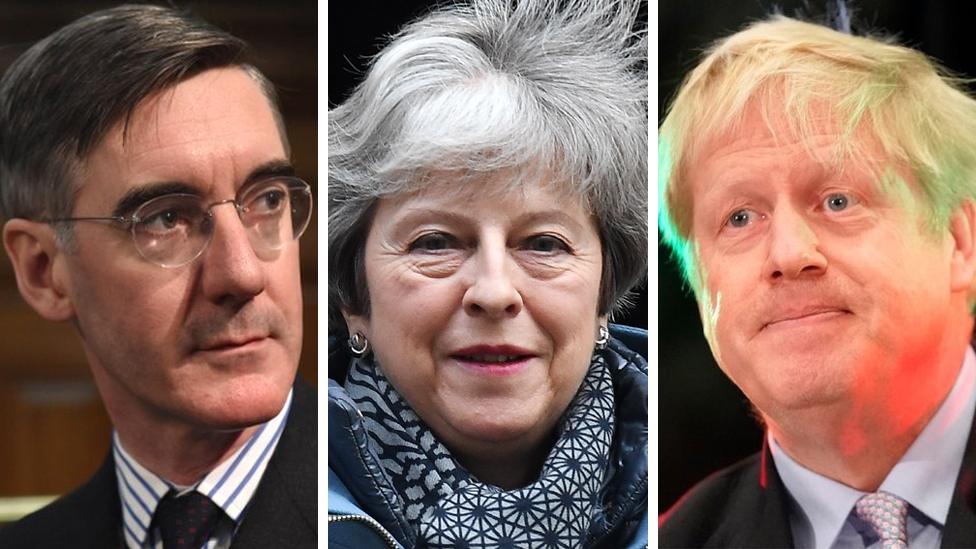Brexit: Are Leave-backers softening on Theresa May's deal?
- Published

Can Theresa May's deal win over leading Brexiteers like Jacob Rees-Mogg (left) and Boris Johnson (right)?
It's definitely a maybe.
Neither Jacob Rees-Mogg nor Boris Johnson are ready to say they will back Theresa May's deal (and I don't suppose either of them have much in common with the Gallagher brothers either).
But after weeks of behaving as if the prime minister's compromise agreement with the EU is a heinous political crime about to be inflicted on the country, they are singing a rather different tune.
Yes, they are explicit. They absolutely do not want to accept the controversial backstop for reasons we've discussed here more times than I care to remember.
But the band of Brexiteers are talking now about the possibility of being able to back the deal.
Why? Partly, it's a reflection of what Brexiteers now in public, and behind the scenes, believe - that the argument is starting to move after weeks of pretty stale trench warfare.
Government insiders, not just Brexiteers, now believe they will have to get the EU to look again at the overall divorce deal, not just the promises being made about the future in the political declaration - the second part of the agreement that leaves an awful lot to be sorted out after the UK's actual departure.
That is a shift. And it might mean the prime minister raises it in a rather more firm way with her EU counterparts, unlike in previous conversations where it's suggested she did not actually ask for that to happen.
Moves on the backstop
Brexiteers also believe the arguments are going their way around the EU - well, perhaps more realistically, starting to edge their way.
The official position in Brussels is that there can't be renegotiation of the divorce deal. It's the deal they sweated over and Parliament has to get on with being clear about what it wants.
But it doesn't want the backstop. And there have been a few hints that Brexiteers have seized on that suggest, perhaps, that the refusal to acknowledge changing the backstop is starting to soften.
Those hopes may well, of course, prove to be totally unfounded. There is nothing remotely to guarantee movement that could untangle the tightest of knots.
Why is the Northern Ireland border an issue?
And there's a third reason why Brexiteers may want to be seen to be playing nice.
With Parliament on the verge of an attempt to take formal control of this whole process - you can read about all of those amendments here - there are nerves among Eurosceptics about a delay to our departure from the EU and potential moves to stop it happening at all.
And also, while Brexiteers say they aren't scared of it, no politician, whatever their stance, will want to take the blame if we leave without a formal deal and there are months of unhappy turmoil.
This tribe does not want to look as if they are the wreckers - the ones being unreasonable.
But in another sign of the wild kinds of suggestions this slow moving crisis is producing, Jacob Rees-Mogg today suggested that if MPs vote to take control of Brexit next week, the government should shut down Parliament.
Whether you think that's reasonable from a man who argued for Parliament having more power is down to you.